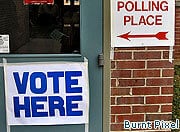Voters in the American state of Oklahoma have decided to ensure that Islamic Sharia law cannot gain a foothold in their state courts.
The vote came in a night of drama in the US midterm elections, in which the state of California also rejected moves to legalise cannabis.
Oklahoma voters gave a resounding ‘no’ to Sharia, with 70 per cent backing Republican Rex Duncan’s move to ban state courts from using international or Sharia law.
Opposition
Mr Duncan said the move was a precautionary measure designed to close the door on activist judges who may have tried to use Sharia law.
A separate proposal in California would have made it legal for adults aged 21 and over to grow up to 25 square feet of cannabis and possess up to an ounce of the drug.
Opposition to the plan came from every major newspaper, both political parties and the two candidates for governor, according to US news group MSNBC.
Addiction
But billionaire George Soros and two entrepreneurs who were involved with setting up the Facebook social networking site gave big donations to the pro-cannabis campaign.
The proposal was defeated by 54 per cent to 46 per cent.
White House drug czar Gil Kerlikowske said the result showed voters recognised that legalising the drug would not make Californians healthier or solve the state’s budget problems.
Instead, Mr Kerlikowske commented, legalisation would lead to more addiction, driving accidents and emergency room admissions.
Surge
In the UK cannabis was downgraded from a Class B drug to a Class C drug in 2004. The move was a disaster.
In the three years after the law in the UK was weakened the number of cannabis addicts receiving NHS treatment doubled.
The reclassification was also accompanied by a surge in the number of children aged 15 and under being treated for mental illness.
And a study lasting 27 years involving 50,000 people showed that smoking cannabis trebles the risk of a young person developing schizophrenia.
Psychosis
Eventually, in response to pressure from judges, police, parents and mental health experts, cannabis was re-classified back up to Class B.
In September a professor and long-time drugs campaigner called for cannabis use to be legalised under licence in the UK.
Prof Roger Pertwee claimed that increasing the availability of the drug would prevent drug-related crime and reduce the chance of people progressing to harder drugs.
But Prof Pertwee’s contentious licensing proposal would mean that anyone who wasn’t suffering from a serious mental illness or at risk of psychosis would be allowed to purchase the drug.
Cautioned
Responding to Prof Pertwee’s call, Mary Brett, from the campaign group Europe Against Drugs, cautioned that it was impossible to predict who would react badly to the drug.
And a spokesperson for the Home Office said there was “clear evidence” that cannabis is a harmful drug, adding the Government did not believe decriminalising the drug was “the right approach”.

